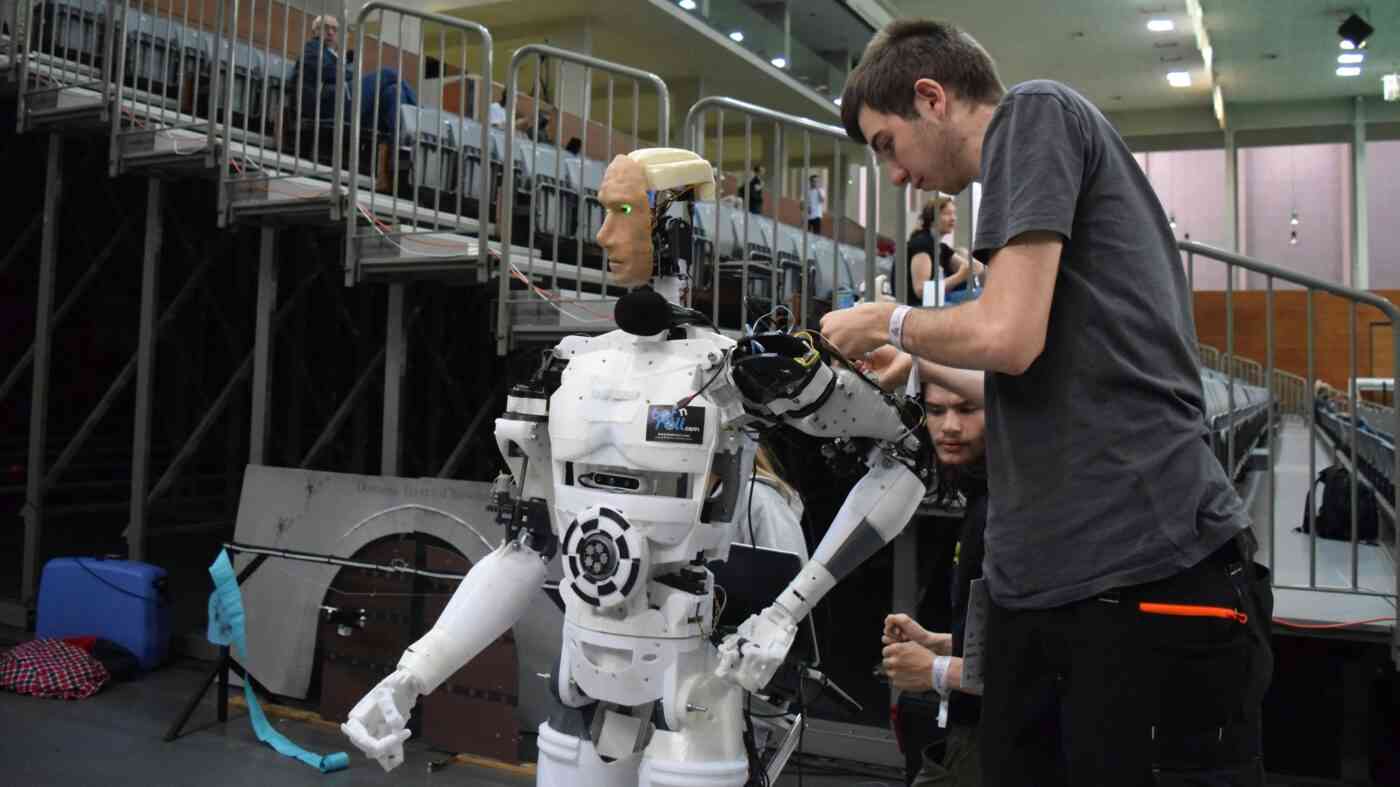Science
Inside China’s “Robot Schools”: Humanoid Robots in China Learn Work
14 February 2026

One popular comedy film features a quote to this effect: “You can do everything, try with all your might, follow the methods you read about in books, but he will still end up on the couch one day, complaining to some strange woman that you said something you don’t even remember.” The prospect of becoming a parent provides us with an earnest resolve never to repeat past mistakes, especially those made towards us by our parents. Amidst all this, we often forget that a happy mum and dad create a happy child.
There is a tense atmosphere in the air. Everyone is anxiously waiting in anticipation. Although childbirth in the 21st century has a very low risk of complications, it is proving very difficult to avoid negative thoughts and the question that keeps cropping up in our head: “What if something goes wrong?” All this is brushed aside, however, when we hear the newborn’s first sweet cry – we immediately become enveloped in a warm cloud of gratitude. In this one moment, everything else fades into the background, and we realize that we are ready to do whatever it takes for our child.
Contemporary knowledge of child-rearing is supported by numerous studies, and it seems that there is a tendency to settle the score with former ‘harmful’ methods in regard to authorities in education.
Indeed, many of the parenting methods used in the past are nowadays considered damaging and demeaning to children. Seeing the young child as a human being and providing the child with subjectivity enabled the adoption of a completely different perspective in understanding emotions and needs, empowering the caregiver to value care more than strict discipline. What is crucial is that raising children is, to some extent, dependent on the reality of the family’s everyday life, just like many other aspects of its day-to-day existence. Those who criticize childhood overprotection are often people who themselves were brought up during challenging times, where priorities focused on meeting the needs of a ‘lower’ rank – people who lived during a military conflict or in times of serious economic crises. In these circumstances, the requirement to care for emotional needs gave way to having to teach the child to cope in, at times, extreme conditions. What mattered, therefore, was persistence, discipline and absolute respect for authority.
Today, living conditions in highly developed countries are exceptionally favorable in terms of the ability to meet physiological and safety needs. This allows focus to be placed on the more subtle but no less vital needs of the human soul, of which emotions are an expression.
Practice shows that human beings do not function any better when surrounded by material excess and splendor. Modern times continue to surprise us with new and unfamiliar challenges and crises. Parents are often frustrated by the fact that despite all the effort they put in and providing their children with what they themselves often did not have, their offspring develop emotional problems and disorders that require outside help.
Being hit with such reality demonstrates that the pursuit of an ideal upbringing, however praiseworthy, will still fail to protect our children from all dangers.
This does not have to be a duel or a competition, and caring for yourself does not prevent you from caring for your child. Moreover, raising a happy child while being unhappy yourself seems an impossible feat. There is nothing wrong with healthy selfishness, even though the word itself is often interpreted as pejorative. Setting boundaries, being aware of your needs and achieving them do not necessarily have to come at the expense of the child. This does not mean, however, that we should only look to our needs when we are confident that our child does not require our assistance at that point in time. It’s highly unlikely we will ever attain such a level of comfort. Taking all this into consideration, we should become aware of our right to take care only of ourselves at each developmental stage of our offspring.

Losing yourself in never-ending child-rearing chores is frequently a source of friction in the spousal relationship. Mothers of newborns regularly forget about themselves and their needs, let alone their husbands, who still need their wives. The situation has been altered somewhat by the partnership model, in which men become involved in childcare to the same degree as women. This being said, despite the fact that both parents look after the child together by sharing their time and space, in reality, they are apart. Wishing to devote themselves entirely to their offspring, they unreservedly embody the role of a mother or father, leaving themselves no leeway to fulfill the role of a husband, wife, or partner. When the moment comes for the child to part ways with their family, parents are faced with gaping emptiness. The empty nest syndrome, as an element of the natural developmental crisis, is the more acute, the less effort is invested in the mutual relationship of the partners. When the child becomes independent, the parents are given the opportunity to reconnect; however, the time spent in their parent roles often leaves them with little knowledge about one another – they unwittingly become total strangers.
The dangers facing people today have a very different dimension to the one stipulated by the fight or flight mechanism. Although the physiological response of the body is the same, the threats are mostly internal rather than external.
Humans have developed a variety of defense mechanisms in order to survive. We try to anticipate potential risks and prevent our exposure to them. This applies to ourselves but also to our children. As parents, we are responsible for ensuring their safety and providing the right conditions for their healthy development. Over-anxious parents may demonstrate excessive vigilance, creating tension for themselves and their children. Meanwhile, the world we live in is safer than ever. Although we are constantly ‘bombarded’ by media reports of extremely violent incidents and tragic accidents, an incredibly useful approach is to come to terms with the notion that our children are safe at their school, sports club or when meeting friends.
You may also like:
Constant ruminations and wallowing in negative thoughts are symptoms of being too attached to your child. Meanwhile, with time, your child will need increasing amounts of independence, and your refusal to grant internal consent for your child to achieve autonomy paradoxically offers a greater risk of harm than the external world perceived by you as threatening.
The initial investment of time and resources in raising children is difficult to underestimate. The care a child needs from birth to leaving school is immense. Nevertheless, people with children derive many personal benefits from having offspring. This should never be considered egocentric behavior but a natural mutual reward mechanism and a method of exchanging resources that characterizes all social groups, including, perhaps above all, the family.
Having children seems to satisfy our unconscious inner need to achieve ‘immortality’. By passing on our genes, we are indirectly guaranteed that a part of us will live on after our death. The vehicle for this realized fantasy is a sense of meaning and self-fulfillment in the role of a parent and later grandparent or great-grandparent.
When children reach an appropriate level of maturity and become parents themselves, it is very common for contact between children and parents to intensify once more. At that time, young parents seek support and good advice. They may also want to benefit from our experience. In the autumn of our life, we once again feel needed, competent and loved. We then enter into an internal dialogue with our past, which allows us to appraise and come to terms with our past mistakes committed as parents. Through our grandchildren, we compensate our children for the shortcomings we believe they may be conscious of and whose cause we attribute to ourselves. The opportunity to ‘make amends’ frees us from guilt and reconnects us with our loved ones, incorporating us into a system in which we play a vital and useful role. The feeling of ‘being needed’ is invaluable at this stage of our life.
In general terms, altruism means acting for the greater good. Such an understanding of the concept can lead us to falsely believe that, in order for it to exist, our behavior must be entirely selfless. Meanwhile, reaping personal benefits from doing good does not detract from our altruistic behavior. On the contrary, it is an inseparable component of it.
A similar approach could be used to sum up having children. There is nothing wrong with following one’s own interests when planning a family. By thinking of the family as a primary social support system, we can count on our children to take care of us and our needs in the future. Of course, we cannot assume that our wishes will be met in terms of organizational aspects. However, having children provides us with a degree of reassurance that when we become dependent on others, we will be able to rely on such support.
We cannot avoid mistakes, we cannot change the past, and we cannot predict the future. In all honesty, we only have a say about the here and now. We keep learning throughout our entire lives, continuously faced with various challenges. Experiencing each of these developmental challenges in harmony with each other, in touch with our own emotions and in honesty with others will foster a life without fear, uncertainty and sadness. What must be rejected is the image of a utopia that we want to create for ourselves and our children. If we believe in paradise on earth, we must attain it first. And if we are ‘team skeptic,’ we should at least try to squeeze as much as possible out of life so that one day we can say that we don’t regret anything. Neither the good nor the bad.
We recommend:

Science
13 February 2026

Science
13 February 2026

Zmień tryb na ciemny